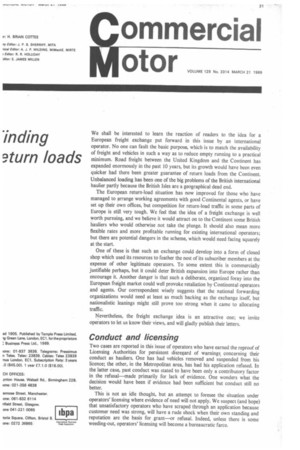ommercial otor
Page 23

If you've noticed an error in this article please click here to report it so we can fix it.
We shall be interested to learn the reaction of readers to the idea for a European freight exchange put forward in this issue by an international operator. No one can fault the basic purpose, which is to match the availability of freight and vehicles in such a way as to reduce empty running to a practical minimum. Road freight between the United Kingdom and the Continent has expanded enormously in the past 10 years, but its growth would have been even quicker had there been greater guarantee of return loads from the Continent. Unbalanced loading has been one of the big problems of the British international haulier partly because the British Isles are a geographical dead end.
The European return-load situation has now improved for those who have managed to arrange working agreements with good Continental agents, or have set up their own offices, but competition for return-load traffic in some parts of Europe is still very tough. We feel that the idea of a freight exchange is well worth pursuing, and we believe it would attract on to the Continent some British hauliers who would otherwise not take the plunge. It should also mean more flexible rates and more profitable running for existing international operators; but there are potential dangers in the scheme, which would need facing squarely at the start.
One of these is that such an exchange could develop into a form of closed shop which used its resources to feather the nest of its subscriber members at the expense of other legitimate operators. To some extent this is commercially justifiable perhaps, but it could deter British expansion into Europe rather than encourage it. Another danger is that such a deliberate, organized foray into the European freight market could well provoke retaliation by Continental operators and agents. Our correspondent wisely suggests that the national forwarding organizations would need at least as much backing as the exchange itself, but nationalistic leanings might still prove too strong when it came to allocating traffic.
Nevertheless, the freight exchange idea is an attractive one; we invite operators to let us know their views, and will gladly publish their letters.
Conduct and licensing
Two cases are reported in this issue of operators who have earned the reproof of Licensing Authorities for persistent disregard of warnings, concerning their conduct as hauliers. One has had vehicles removed and suspended from his licence; the other, in the Metropolitan area, has had his application refused. In the latter case, past conduct was stated to have been only a contributory factor in the refusal—made primarily for lack of evidence. One wonders what the decision would have been if evidence had been sufficient but conduct still no better.
This is not an idle thought, but an attempt to foresee the situation under operators' licensing where evidence of need will not apply. We suspect (and hope) that unsatisfactory operators who have scraped through an application because customer need was strong, will have a rude shock when their own standing and reputation are the basis for grant—or refusal. Indeed, unless there is some weeding-out, operators' licensing will become a bureaucratic farce.
























































































































